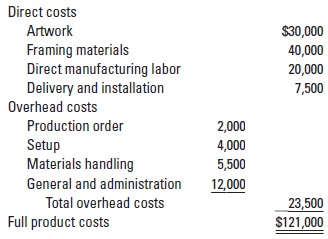Problem:
Ethics and pricing. Apex Art has been requested to prepare a bid on 500 pieces of framed artwork for a new hotel. Winning the bid would be a big boost for sales representative Jason Grant, who works entirely on commission. Sonja Gomes, the cost accountant for Apex, prepares the bid based on the following cost information:

Based on the company policy of pricing at 125% of full cost, Gomes gives Grant a figure of $151,250 to submit for the job. Grant is very concerned. He tells Gomes that at that price, Apex has no chance of winning the job. He confides in her that he spent $500 of company funds to take the hotel's purchasing agent to a basketball playoff game where the purchasing agent disclosed that a bid of $145,000 would win the job. He hadn't planned to tell Gomes because he was confident that the bid she developed would be below that amount. Gomes reasons that the $500 he spent will be wasted if Apex doesn't capitalize on this valuable information. In any case, the company will still make money if it wins the bid at $145,000 because it is higher than the full cost of $121,000.
Required
1. Is the $500 spent on the basketball tickets relevant to the bid decision? Why or why not?
2. Gomes suggests that if Grant is willing to use cheaper materials for the frame, he can achieve a bid of $145,000. The artwork has already been selected and cannot be changed, so the entire amount of reduction in cost will need to come from framing materials. What is the target cost of framing materials that will allow Grant to submit a bid of $145 assuming a target markup of 25% of full cost?
3. Evaluate whether Gomes' suggestion to Grant to use the purchasing agent's tip is unethical. Would it be unethical for Grant to redo the project's design to arrive at a lower bid? What steps should Grant and Gomes take to resolve thissituation?